2024届高考英语二轮复习模块精讲:专题十二 情态动词和虚拟语气课件【新教材新高考】(共56张PPT)
文档属性
| 名称 | 2024届高考英语二轮复习模块精讲:专题十二 情态动词和虚拟语气课件【新教材新高考】(共56张PPT) |  | |
| 格式 | pptx | ||
| 文件大小 | 381.7KB | ||
| 资源类型 | 教案 | ||
| 版本资源 | 通用版 | ||
| 科目 | 英语 | ||
| 更新时间 | 2024-02-22 15:38:56 | ||
图片预览


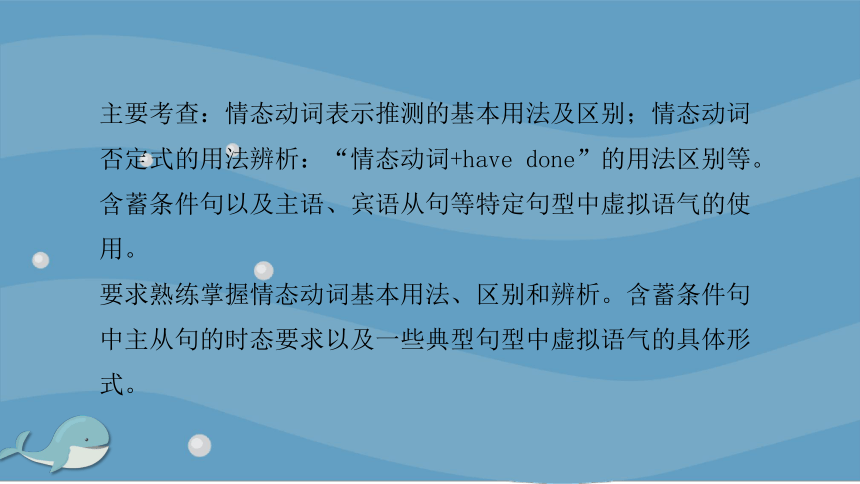


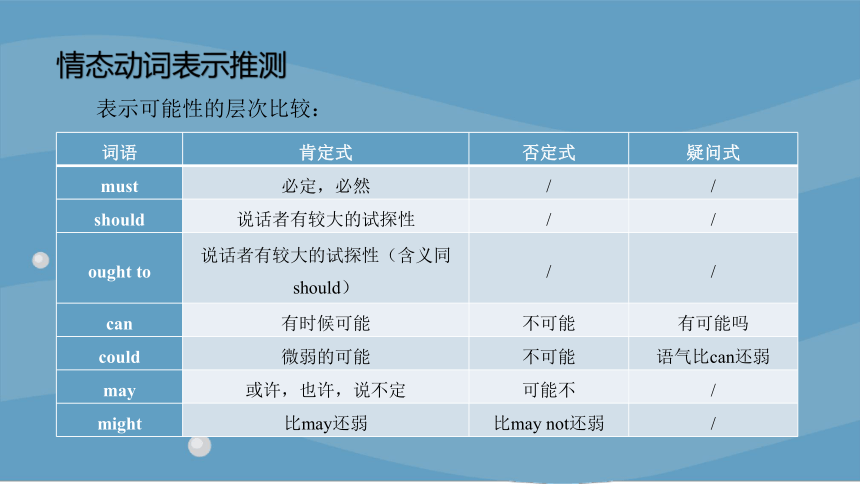
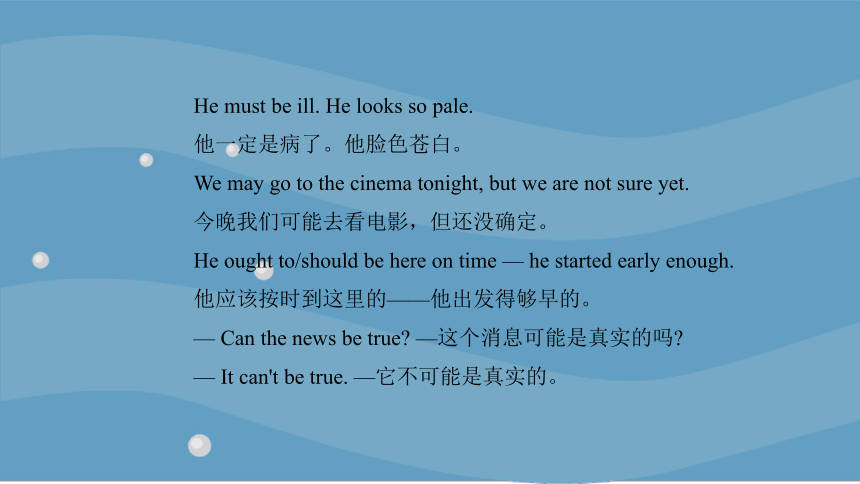
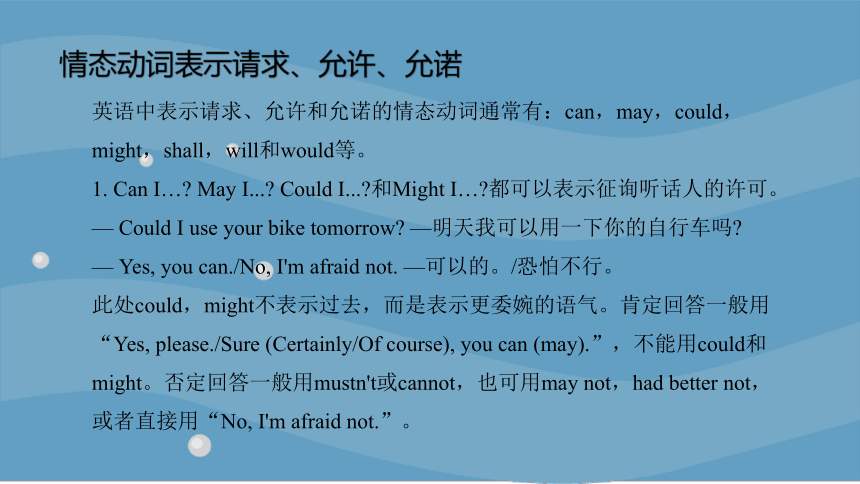
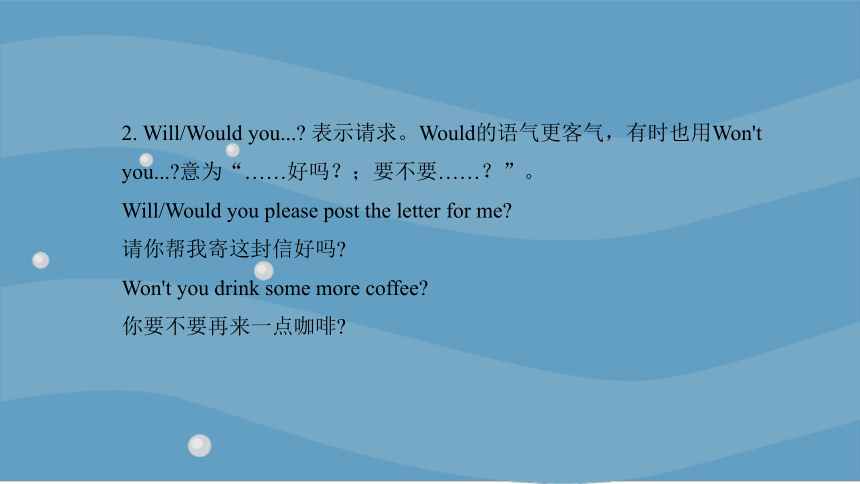
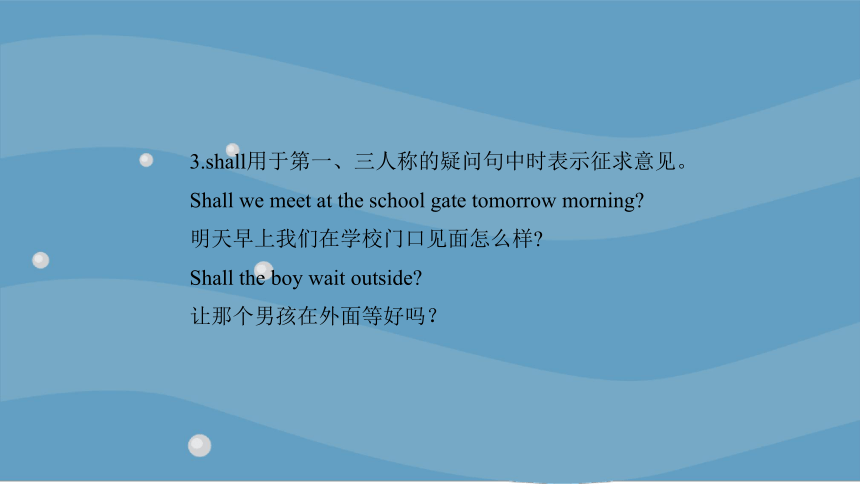
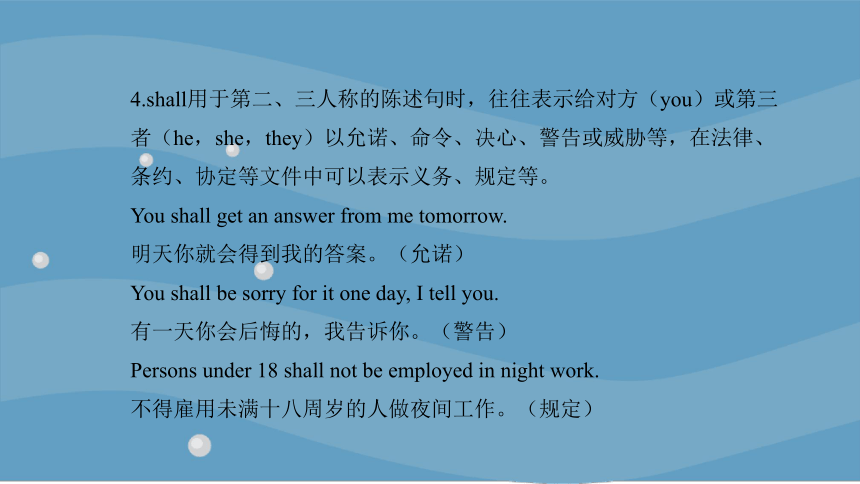

文档简介
(共56张PPT)
专题十二
情态动词和虚拟语气
新教材新高考
模块考情分析
主要考查:情态动词表示推测的基本用法及区别;情态动词否定式的用法辨析:“情态动词+have done”的用法区别等。含蓄条件句以及主语、宾语从句等特定句型中虚拟语气的使用。
要求熟练掌握情态动词基本用法、区别和辨析。含蓄条件句中主从句的时态要求以及一些典型句型中虚拟语气的具体形式。
重难提分技巧
情态动词的基本用法
情态动词表示推测
表示可能性的层次比较:
词语 肯定式 否定式 疑问式
must 必定,必然 / /
should 说话者有较大的试探性 / /
ought to 说话者有较大的试探性(含义同should) / /
can 有时候可能 不可能 有可能吗
could 微弱的可能 不可能 语气比can还弱
may 或许,也许,说不定 可能不 /
might 比may还弱 比may not还弱 /
He must be ill. He looks so pale.
他一定是病了。他脸色苍白。
We may go to the cinema tonight, but we are not sure yet.
今晚我们可能去看电影,但还没确定。
He ought to/should be here on time — he started early enough.
他应该按时到这里的——他出发得够早的。
— Can the news be true —这个消息可能是真实的吗
— It can't be true. —它不可能是真实的。
情态动词表示请求、允许、允诺
英语中表示请求、允许和允诺的情态动词通常有:can,may,could,might,shall,will和would等。
1. Can I… May I... Could I... 和Might I… 都可以表示征询听话人的许可。
— Could I use your bike tomorrow —明天我可以用一下你的自行车吗
— Yes, you can./No, I'm afraid not. —可以的。/恐怕不行。
此处could,might不表示过去,而是表示更委婉的语气。肯定回答一般用“Yes, please./Sure (Certainly/Of course), you can (may).”,不能用could和might。否定回答一般用mustn't或cannot,也可用may not,had better not,或者直接用“No, I'm afraid not.”。
2. Will/Would you... 表示请求。Would的语气更客气,有时也用Won't you... 意为“……好吗?;要不要……?”。
Will/Would you please post the letter for me
请你帮我寄这封信好吗
Won't you drink some more coffee
你要不要再来一点咖啡
3.shall用于第一、三人称的疑问句中时表示征求意见。
Shall we meet at the school gate tomorrow morning
明天早上我们在学校门口见面怎么样
Shall the boy wait outside
让那个男孩在外面等好吗?
4.shall用于第二、三人称的陈述句时,往往表示给对方(you)或第三者(he,she,they)以允诺、命令、决心、警告或威胁等,在法律、条约、协定等文件中可以表示义务、规定等。
You shall get an answer from me tomorrow.
明天你就会得到我的答案。(允诺)
You shall be sorry for it one day, I tell you.
有一天你会后悔的,我告诉你。(警告)
Persons under 18 shall not be employed in night work.
不得雇用未满十八周岁的人做夜间工作。(规定)
情态动词表示必要性
表示“必要性”的情态动词通常有:must,should,ought to,have to。
1.ought to与should意思大体相同,但ought to语气比should重,往往表示从法律或道义上讲“应该”。
You are his father and ought to take care of him.
你是他父亲,应当照顾他。(有责任,从道义上讲应该)
Young people should show respect for the old.
年轻人应该尊重老年人。
2.have to表示“必须,不得不”,这个意思与must很接近,但must表示主观意志,而have to表示由于客观因素不得不做某事。
I told her that she must give up smoking.
我叫她必须戒烟。
I have to hand in my term paper before 5:00 p. m. today.
今天下午5点前我必须交学期论文。
情态动词表示能力
表示“能力”的情态动词有:can,could,be able to。
1.情态动词can只有两种时态形式:现在时can和过去式could,而be able to有多种时态形式。
Mary can play the piano. She has been able to play it since she was five.
玛丽会弹钢琴,她从5岁起就会弹了。
2.表示过去的能力时,was/were able to表示经过一番努力后取得了成功,相当于manage to do或succeed in doing,而could 没有这个含义。
Yesterday I was able to get home before the heavy rain.
昨天我在下大雨前赶回了家。
注意:
①can只有一般现在时和一般过去时,而be able to则有更多的时态,如将来时、完成时等。
If you travel in any other country in the world, you will still be able to use English.
如果你在世界上的其他任何一个国家旅游,仍然可以使用英语。
②be able to用于过去时态表示能力时,侧重于经过努力而成功做到某事;而could仅表示具备能力,不说明是否实施了能力。
He was able to flee to Europe before the war broke out.
战争爆发前,他成功地逃到了欧洲。
③跟在其他动词,如might,may,would,want,hope,used to等之后表示能力只能用be able to。
I've always wanted to be able to speak Japanese.
我一直想学会讲日语。
“情态动词+have done”的用法
1.must have done表示对过去已发生的事情进行肯定的推断,只用于肯定句中,意为“一定,必定”,其否定形式为:can't/cannot have done。
You must have gone to bed late last night. Your eyes are red.
昨晚你一定睡得很晚,你的眼睛红红的。
I saw Mr. Wang just now. He couldn't have gone abroad.
刚刚我还看见了王先生,他不可能已经出国了。
2.could have done意为“本来可以……,本来能够……”,表示虚拟语气。
This accident could have been prevented.
这次事故本来是可以避免的。
3.may/might have done表示对过去已发生的事情进行推断,意为“可能/或许已经……”,其否定形式为may/might not have done,意为“可能没有做……”。
It's no use going to his house. He may not have gone home. He may have gone somewhere else.
去他家没用。他可能没有回家,可能已经去了别的地方。
4.should/ought to have done表示本应该做某事,却没有做,含有责备或后悔之意。其否定形式为should not/ought not to have done,表示本不该做某事却做了。
They should have finished their work before playing.
他们本应该在玩耍前完成作业的。
You ought not to have made fun of him. He is not the one you laugh at but learn from.你本不应该取笑他的。他不是你要嘲笑的人而是你应该学习的榜样。
5.needn't have done表示本没有必要做某事却做了,多用于否定句中。
Look, it's raining now. You needn't have watered the flowers.
看,现在下雨了,你当初不必给花浇水的。
注意:
needn't do sth.表示“没有必要去做某事”,时间上应该是现在或将来。
You needn't telephone him now, for he isn't at home.
你现在不必打电话给他,因为他不在家。
情态动词的其他用法
1.情态动词need和dare的用法
(1)need 和dare作情态动词时常用于否定句、疑问句或条件句中,无人称和数的变化,疑问句和否定句中不加助动词。
Need I telephone him now
需要我现在打电话给他吗
She dare not go out alone at night.
她晚上不敢一个人出去。
(2)need和 dare用作实义动词时,有词形变化,变成否定句、疑问句时,需要加助动词。
You don't need to do it yourself.
你不必亲自做这件事。
We should dare to give our own opinion.
我们要敢于提出自己的观点。
2.几个可以表示某一特定的语气或态度的情态动词
(1)can可以用来表示惊异、怀疑、不相信的态度,主要用于否定句、疑问句或感叹句中。
How can you be so careless
你怎么这么粗心
(2)must用于条件句或疑问句时,带有责备、抱怨的感彩,意为“偏要,硬要”。
Why must you be so late
你为何非要这么晚呢
(3)may表示愿望、祝福时,有“但愿,祝……”之意。
May you succeed!
祝你成功!
(4)should表示惊讶、不以为然等情绪,用于某些句型中,多意为“竟然”。
It seems unfair that this should happen to me.
这种事情竟然发生在我的身上,好像不公平。
(5)will表示“意愿,意志”,would表示过去时间的“意愿,意志”。will 还可以表示某种倾向或习惯性动作,意为“总会,老是”,其否定结构意为“不肯,不能”。
I will do anything for you.
我愿意为你做任何事。
The door won't open.
这门打不开。
Every time she was in trouble, she would turn to him for help.
她每次遇到麻烦都会向他求助。
3.情态动词的一些习惯用法
(1)cannot/can never... too或 cannot... enough 表示“无论怎么……也不过分;越……越好”。
You cannot be too careful.
你越细心越好。
(2)cannot help doing.../cannot help but do.../cannot but do...表示“禁不住;不得不”。
I couldn't help jumping up when I saw him.
一看到他我就情不自禁地跳了起来。
I cannot but admire his bravery.
我不得不佩服他的勇敢。
(3)“may/might as well+动词原形”意为“还不如,不妨”,相当于had better。
It is very late, so you may/might as well go to bed.
夜深了,你不妨去睡吧。
非真实条件状语从句中的虚拟语气
条件状语从句中的谓语动词用一般过去时(be动词用were),而主句中的谓语动词用“would/should/could/might+动词原形”。
1.表示与现在事实相反的假设
If I were you, I would buy that house.
如果我是你,我会买那所房子。
If he had time, he should go with you.
如果他有时间,他会跟你一起去。
2.表示与过去事实相反的假设
条件状语从句中的谓语动词用过去完成时,主句中的谓语动词则用“would/should/might/could+have+过去分词”。
If he had taken my advice, he would have succeeded in passing the examination.
如果他听取我的建议,他会成功通过考试的。
3.表示与将来事实相反的假设
条件状语从句中的谓语动词用一般过去时或“should/were to+动词原形”,主句中的谓语动词则用“would/should/could/might+动词原形”。
If it were to rain tomorrow, the football match would be put off.
如果明天下雨,足球比赛就会推迟。
4.省略if的虚拟条件句
当虚拟条件句中有should,had或were时,可以省略 if,且把should,had或were提至主语前,变为倒装句式。
Had he seen you yesterday, he would have returned your book.
假如他昨天看见你的话,就会把书还给你了。
Should it rain tomorrow, the sports meeting would be put off.
如果明天下雨,运动会就会延期。
5.混合虚拟语气
当条件从句和主句所表示的动作发生的时间不一致时,就形成了混合虚拟语气。此时,从句和主句根据各自谓语动作发生的时间不同,采用相应的谓语动词形式。
If I shouldn't have an exam this afternoon, I would go shopping now.
如果不是今天下午要考试,我现在就去购物了。(从句指将来,主句指现在)
If you had taken my advice then, you wouldn't be in trouble now.
如果当时听我的劝告,你现在就不会有麻烦了。(从句指过去,主句指现在)
6.含蓄虚拟条件句
有时假设的情况不通过if条件从句表达出来,而是通过一些词或短语表达出来。如with,without,but for等表示或隐含在上下文中。
I'm really busy; otherwise, I would certainly go with you.
我确实太忙了,不然的话,我一定和你一起去。
But for the rain we should have had a pleasant journey.
要不是下雨,我们会有一次愉快的旅行。
名词性从句中的虚拟语气
1.虚拟语气在宾语从句中的用法
(1)表示“命令、建议、要求”等的动词,如suggest,order,insist等后的宾语从句中,谓语动词用“should+动词原形”,should可以省略。
I suggest that we (should) set off at once.
我建议我们立刻出发。
I recommend that everyone (should) attend the party.
我提议大家都参加这次聚会。
注意:
suggest表示“暗示,表明”,insist表示“坚持认为”时,其后的从句不用虚拟语气。
The smile on his face suggested that he agreed to this plan.
他脸上的微笑表明他同意这个计划。
The boy insisted that he hadn't broken the window.
小男孩坚持说他没有打碎窗户。
(2)wish后的宾语从句中,用一般过去时表示与现在事实相反,用过去完成时表示与过去事实相反,用“would/could/might+动词原形”表示与将来事实相反。
I wish it were autumn in Beijing all the year around.
我希望北京全年都是秋天。
I wish I had known the answer to the question.
我真希望当时知道这个问题的答案。
(3)would rather后的宾语从句中,用一般过去时表示与现在或将来事实相反,用过去完成时表示与过去事实相反。
I would rather that you came tomorrow.
我宁愿你明天来。
I would rather that you hadn't told him.
我宁愿你没有告诉他。
2.虚拟语气在表语从句和同位语从句中的用法
在表示“建议、命令、主张”等名词后面的表语从句和同位语从句中用虚拟语气,谓语动词用“should+动词原形”,should可以省略。
He gave orders that the guests (should) be hospitably entertained.
他下令热情款待这些客人。
3.虚拟语气在主语从句中的用法
在 It is necessary (important, strange, natural, etc.) that…, It is requested (suggested, desired, proposed, etc.) that…, It is a pity (a rule, a shame, a surprise, no wonder, etc.) that...等结构中,that引导的主语从句要用虚拟语气,谓语动词用“should+动词原形”,should 可以省略。
It is important that we (should) think before we decide.
三思而后行是重要的。
It is suggested that parents (should) spend more time with their children alone.
人们建议父母应该花更多的时间和孩子单独相处。
4.虚拟语气的其他用法
(1)It's (high/about) time之后的从句用虚拟语气,谓语动词用过去时或should do。
It is high time that you went/should go to school.
到你该去上学的时间了。
(2)if only引导的从句中需用虚拟语气,句子多用一般过去时或过去完成时。
If only I were as clever as you!
要是我像你一样聪明就好了!
(3)as if引导的方式状语从句中,用一般过去时表示与现在事实相反,用过去完成时表示与过去事实相反。
They talked as if they had been friends for years.
他们说话的样子好像是多年的朋友似的。
典例分析
一、阅读下面短文, 在空白处填入1个适当的单词或括号内单词的正确形式。
There ①______(be) countless things that can influence your sleep. However, there’s one surprising factor that could be affecting your sleep: the paint of color in your bedroom. According ②______ a new survey, painting your bedroom a color that’s too bright or even too dark influences your sleep.
Different colors can set different ③______ (mood) in your space, some of ④______ may not be favorable to sleep. If you want your bedroom to be more calming, you’d ⑤______ (good) explore neutrals(中和色), light greens, and golds.
are
better
which
moods
to
As is described in the survey, dramatic colors like “bright reds, deep browns, and even olive greens” are less likely ⑥______ (leave) you feeling bright-eyed in the morning. Besides, having too dark a room may not keep you up at night, ⑦______ it can damage your energy upon ⑧________ (wake). On the other hand, a bright color should be avoided in the bedroom because it has the potential to interrupt sleep and promote activity rather than relaxation.
Anyway, that doesn’t mean that dramatic colors have to be off the table ⑨______ (entire). But remember: when you decorate your rooms, choosing the right color is ⑩______ must.
a
entirely
but/yet
waking
to leave
二、阅读下面短文, 在空白处填入1个适当的单词或括号内单词的正确形式。
Lyu Yugang, director of the ministry's department of basic education, said 77.14 million parents were surveyed to find out ①_________ their children were getting enough sleep. A total of 76.2 percent of ②__________ (participate) said their children were getting the recommended sleep time of 10 hours a night for primary school students and nine hours for ③_____ in secondary school. Last year's survey found only about 40 percent of students were getting enough sleep, Lyu said.
whether/if
those
participants
In April, the ministry advised that a primary school student ④_________ (go) to bed before 9:20 pm, a middle school student before 10 pm and high school student before 11 pm. ⑤_________ (separate), 99.8 percent of primary and secondary schools have issued rules preventing students ⑥_________ (bring) smartphones to class and provided communication channels for students to contact their parents in an emergency, he said.
Luo Lin, a vice-principal of a school in Beijing, said, “Some students go to bed late not because they have heavy academic burdens, ⑦_____ because they are following the examples of their parents. While tough measures ⑧_____________ (take) for months to limit the amount of time young students can spend ⑨_______ (play) online games to three hours a week, the students might waste time ⑩_____ short video platforms and parents need to act to prevent this.”
have been taken
but
Separately
bringing
(should) go
playing
on
答案解析
一、
解析: 【小题1】考查时态。句意:有无数的东西会影响你的睡眠。根据句型结构分析,此空应填谓语结构形式,后面主语countless things为复数且结合后面句子可推断这里应用一般现在时。故填are。
【小题2】考查介词。句意:根据一个新的调查,把你的卧室凌得太亮或者太淡会影响你的睡眠。根据句型分析,according to是固定搭配表“根据”,为介词短语。故填to。
【小题3】考查名词。句意:不同的颜色能创造出你在你房间的不同心情。根据句意和句型分析可知,mood表“心情"时为可数名词,且前面有different修饰,所以应用复数结构形式。故填moods。
【小题4】考查定语从句。句意:不同的颜色能创造出你在你房间的不同心情,其中的一些颜色可能并不利于睡觉。根据句型分析,此处考查非限制性定语从句,且从句中缺主语,指代前面colors。故填which。
【小题5】考查情态动词。句意:如果你想让你的卧室更加静怡,你最好探索下中和色,谈绿色和金色。根据句型结构和句意可知,此空考查had better构成的情态动词,表最好”,所以good应用比较级。故填better。
【小题6】考查非谓语。句意:正如调查中所描述的,引人注目的颜色像亮红色,深棕色和甚至橄榄绿不可能让你的眼睛在早上清澈明亮。根据句型和句意分析,be less likely to do为固定句型表更不可能做某事”,为形容词短语。故填to leave。
【小题7】考查连词。句意:而且,让一个房间太暗可能不会让你晚上熬夜,但是你一醒来,它会立即损害你的体能。根据句型结构和句意分析,此空前后两句话的关系为转折关系。故填but或yet。
【小题8】考查非谓语。句意看上题解析。upon doing sth “一……就……”,为介词,所以后面动词应变为动名词。故填waking。
【小题9】考查副词。句意:无论如何,这并不意味着引人注目的颜色将完全不予讨论。此空应填副词结构形式,放句尾修饰动词。故填entirely。
【小题10】考查冠词。句意:但是记住,当你装饰你卧室时,选择正确的颜色是必须的一件事。根据句型结构和句意分析,此空后must为名词,表必须做的事”,且为可数名词,首字母的发音为辅音音素,所以前面应加不定冠词a。故填a。
二、
解析:①考查宾语从句。句意:教育部基础教育司司长吕玉刚表示,共有7714万家长参与了调查,以了解孩子的睡眠是否充足。分析句子可知,空格处引导宾语从句,从句句意完整,成分齐全,根据句意,用whether或it弓导宾语从句,表示“是否”,符合语境,故填whether/if。
②考查名词。句意:总计76.2%的参与者说,他们的孩子每晚的睡眠时间达到了小学生的建议时间10小时,中学生的建议时间9小时。分析句子可知,空格处作介词of的宾语,应用名词形式,participate“参加”是动词,名词形式participant“参与者”符合句意,用复数,故填participants。
③考查代词。句意:总计76.2%的参与者表示,他们的孩子每晚的睡眠时间达到了小学生的建议时间10小时,中学生的建议时间9小时。分析句子可知,空格指代上文提到的名词复数students,此处特指“初中的学生”,用指示代词those,相当于the students,故填those。
④考查虚拟语气。句意:在4月教育部建议小学生就寝时间一般不晚于晚上9点20,初中生一般不晚于晚上10点,高中生一般不晚于23:00。advise后的宾语从句使用虚拟语气,从句谓语动词用should+动词原形,should可以省略,故填(should)go。
⑤考查副词。句意:另外,他说,99.8%的中小学发布规定,禁止学生带智能手机来上课,并为学生提供在紧急情况下联系家长的沟通渠道。根据句意,提示词修饰整个句子作状语,用副词形式,另外,句首单词首字母大写,故填Separately。
⑥考查非谓语动词。句意:另外,他说,99.8%的中小学发布规定,禁止学生带智能手机来上课,并为学生提供在紧急情况下联系家长的沟通渠道。prevent sb. from doing sth.“阻止某人做某事”,是固定短语,主动语态中from可以省略,根据句意,故填(from) bringing。
⑦考查连词。句意:北京一所学校的副校长罗林说,一些学生睡觉迟不是因为他们有沉重的学业负担,而是因为他们效仿他们的父母。not.…but.…“不是……而是……”,是固定搭配,故填but。
⑧考查动词时态语态和主谓一致。句意:尽管人们已经数月采取严厉措施将年轻学生每周玩网络游戏的时间限制在3个小时以内,但学生们可能会把时间浪费在短视频平台上,家长们需要行动起来防止这种情况发生。分析句子可知,take是while引导的状语从句谓语动词,由时间状语for months可知,用现在完成时,其主语measures与谓语动词take是被动关系,主语measures是复⑨考查非谓语动词。句意:尽管人们已经数月采取严厉措施将年轻学生每周玩网络游戏的时间限制在3个小时以内,但学生们可能会把时间浪费在短视频平台上,家长们需要行动起来防止这种情况发生。分析句子可知,“young students can spend ⑨_____(play) online games playing”是定语从句,省略了关系代词that, 修饰先行词the amount of time, spend some time doing sth.“花费时间做某事”是固定短语,play用动名词形式,故填playing。
⑩考查介词。句意:尽管人们已经数月采取严厉措施将年轻学生每周玩网络游戏的时间限制在个小时以内,但学生们可能会把时间浪费在短视频平台上,家长们需要行动起来防止这种情况发生。waste some time on sth.“浪费时间在……上”,是固定用法,故填on。
Thank you!
专题十二
情态动词和虚拟语气
新教材新高考
模块考情分析
主要考查:情态动词表示推测的基本用法及区别;情态动词否定式的用法辨析:“情态动词+have done”的用法区别等。含蓄条件句以及主语、宾语从句等特定句型中虚拟语气的使用。
要求熟练掌握情态动词基本用法、区别和辨析。含蓄条件句中主从句的时态要求以及一些典型句型中虚拟语气的具体形式。
重难提分技巧
情态动词的基本用法
情态动词表示推测
表示可能性的层次比较:
词语 肯定式 否定式 疑问式
must 必定,必然 / /
should 说话者有较大的试探性 / /
ought to 说话者有较大的试探性(含义同should) / /
can 有时候可能 不可能 有可能吗
could 微弱的可能 不可能 语气比can还弱
may 或许,也许,说不定 可能不 /
might 比may还弱 比may not还弱 /
He must be ill. He looks so pale.
他一定是病了。他脸色苍白。
We may go to the cinema tonight, but we are not sure yet.
今晚我们可能去看电影,但还没确定。
He ought to/should be here on time — he started early enough.
他应该按时到这里的——他出发得够早的。
— Can the news be true —这个消息可能是真实的吗
— It can't be true. —它不可能是真实的。
情态动词表示请求、允许、允诺
英语中表示请求、允许和允诺的情态动词通常有:can,may,could,might,shall,will和would等。
1. Can I… May I... Could I... 和Might I… 都可以表示征询听话人的许可。
— Could I use your bike tomorrow —明天我可以用一下你的自行车吗
— Yes, you can./No, I'm afraid not. —可以的。/恐怕不行。
此处could,might不表示过去,而是表示更委婉的语气。肯定回答一般用“Yes, please./Sure (Certainly/Of course), you can (may).”,不能用could和might。否定回答一般用mustn't或cannot,也可用may not,had better not,或者直接用“No, I'm afraid not.”。
2. Will/Would you... 表示请求。Would的语气更客气,有时也用Won't you... 意为“……好吗?;要不要……?”。
Will/Would you please post the letter for me
请你帮我寄这封信好吗
Won't you drink some more coffee
你要不要再来一点咖啡
3.shall用于第一、三人称的疑问句中时表示征求意见。
Shall we meet at the school gate tomorrow morning
明天早上我们在学校门口见面怎么样
Shall the boy wait outside
让那个男孩在外面等好吗?
4.shall用于第二、三人称的陈述句时,往往表示给对方(you)或第三者(he,she,they)以允诺、命令、决心、警告或威胁等,在法律、条约、协定等文件中可以表示义务、规定等。
You shall get an answer from me tomorrow.
明天你就会得到我的答案。(允诺)
You shall be sorry for it one day, I tell you.
有一天你会后悔的,我告诉你。(警告)
Persons under 18 shall not be employed in night work.
不得雇用未满十八周岁的人做夜间工作。(规定)
情态动词表示必要性
表示“必要性”的情态动词通常有:must,should,ought to,have to。
1.ought to与should意思大体相同,但ought to语气比should重,往往表示从法律或道义上讲“应该”。
You are his father and ought to take care of him.
你是他父亲,应当照顾他。(有责任,从道义上讲应该)
Young people should show respect for the old.
年轻人应该尊重老年人。
2.have to表示“必须,不得不”,这个意思与must很接近,但must表示主观意志,而have to表示由于客观因素不得不做某事。
I told her that she must give up smoking.
我叫她必须戒烟。
I have to hand in my term paper before 5:00 p. m. today.
今天下午5点前我必须交学期论文。
情态动词表示能力
表示“能力”的情态动词有:can,could,be able to。
1.情态动词can只有两种时态形式:现在时can和过去式could,而be able to有多种时态形式。
Mary can play the piano. She has been able to play it since she was five.
玛丽会弹钢琴,她从5岁起就会弹了。
2.表示过去的能力时,was/were able to表示经过一番努力后取得了成功,相当于manage to do或succeed in doing,而could 没有这个含义。
Yesterday I was able to get home before the heavy rain.
昨天我在下大雨前赶回了家。
注意:
①can只有一般现在时和一般过去时,而be able to则有更多的时态,如将来时、完成时等。
If you travel in any other country in the world, you will still be able to use English.
如果你在世界上的其他任何一个国家旅游,仍然可以使用英语。
②be able to用于过去时态表示能力时,侧重于经过努力而成功做到某事;而could仅表示具备能力,不说明是否实施了能力。
He was able to flee to Europe before the war broke out.
战争爆发前,他成功地逃到了欧洲。
③跟在其他动词,如might,may,would,want,hope,used to等之后表示能力只能用be able to。
I've always wanted to be able to speak Japanese.
我一直想学会讲日语。
“情态动词+have done”的用法
1.must have done表示对过去已发生的事情进行肯定的推断,只用于肯定句中,意为“一定,必定”,其否定形式为:can't/cannot have done。
You must have gone to bed late last night. Your eyes are red.
昨晚你一定睡得很晚,你的眼睛红红的。
I saw Mr. Wang just now. He couldn't have gone abroad.
刚刚我还看见了王先生,他不可能已经出国了。
2.could have done意为“本来可以……,本来能够……”,表示虚拟语气。
This accident could have been prevented.
这次事故本来是可以避免的。
3.may/might have done表示对过去已发生的事情进行推断,意为“可能/或许已经……”,其否定形式为may/might not have done,意为“可能没有做……”。
It's no use going to his house. He may not have gone home. He may have gone somewhere else.
去他家没用。他可能没有回家,可能已经去了别的地方。
4.should/ought to have done表示本应该做某事,却没有做,含有责备或后悔之意。其否定形式为should not/ought not to have done,表示本不该做某事却做了。
They should have finished their work before playing.
他们本应该在玩耍前完成作业的。
You ought not to have made fun of him. He is not the one you laugh at but learn from.你本不应该取笑他的。他不是你要嘲笑的人而是你应该学习的榜样。
5.needn't have done表示本没有必要做某事却做了,多用于否定句中。
Look, it's raining now. You needn't have watered the flowers.
看,现在下雨了,你当初不必给花浇水的。
注意:
needn't do sth.表示“没有必要去做某事”,时间上应该是现在或将来。
You needn't telephone him now, for he isn't at home.
你现在不必打电话给他,因为他不在家。
情态动词的其他用法
1.情态动词need和dare的用法
(1)need 和dare作情态动词时常用于否定句、疑问句或条件句中,无人称和数的变化,疑问句和否定句中不加助动词。
Need I telephone him now
需要我现在打电话给他吗
She dare not go out alone at night.
她晚上不敢一个人出去。
(2)need和 dare用作实义动词时,有词形变化,变成否定句、疑问句时,需要加助动词。
You don't need to do it yourself.
你不必亲自做这件事。
We should dare to give our own opinion.
我们要敢于提出自己的观点。
2.几个可以表示某一特定的语气或态度的情态动词
(1)can可以用来表示惊异、怀疑、不相信的态度,主要用于否定句、疑问句或感叹句中。
How can you be so careless
你怎么这么粗心
(2)must用于条件句或疑问句时,带有责备、抱怨的感彩,意为“偏要,硬要”。
Why must you be so late
你为何非要这么晚呢
(3)may表示愿望、祝福时,有“但愿,祝……”之意。
May you succeed!
祝你成功!
(4)should表示惊讶、不以为然等情绪,用于某些句型中,多意为“竟然”。
It seems unfair that this should happen to me.
这种事情竟然发生在我的身上,好像不公平。
(5)will表示“意愿,意志”,would表示过去时间的“意愿,意志”。will 还可以表示某种倾向或习惯性动作,意为“总会,老是”,其否定结构意为“不肯,不能”。
I will do anything for you.
我愿意为你做任何事。
The door won't open.
这门打不开。
Every time she was in trouble, she would turn to him for help.
她每次遇到麻烦都会向他求助。
3.情态动词的一些习惯用法
(1)cannot/can never... too或 cannot... enough 表示“无论怎么……也不过分;越……越好”。
You cannot be too careful.
你越细心越好。
(2)cannot help doing.../cannot help but do.../cannot but do...表示“禁不住;不得不”。
I couldn't help jumping up when I saw him.
一看到他我就情不自禁地跳了起来。
I cannot but admire his bravery.
我不得不佩服他的勇敢。
(3)“may/might as well+动词原形”意为“还不如,不妨”,相当于had better。
It is very late, so you may/might as well go to bed.
夜深了,你不妨去睡吧。
非真实条件状语从句中的虚拟语气
条件状语从句中的谓语动词用一般过去时(be动词用were),而主句中的谓语动词用“would/should/could/might+动词原形”。
1.表示与现在事实相反的假设
If I were you, I would buy that house.
如果我是你,我会买那所房子。
If he had time, he should go with you.
如果他有时间,他会跟你一起去。
2.表示与过去事实相反的假设
条件状语从句中的谓语动词用过去完成时,主句中的谓语动词则用“would/should/might/could+have+过去分词”。
If he had taken my advice, he would have succeeded in passing the examination.
如果他听取我的建议,他会成功通过考试的。
3.表示与将来事实相反的假设
条件状语从句中的谓语动词用一般过去时或“should/were to+动词原形”,主句中的谓语动词则用“would/should/could/might+动词原形”。
If it were to rain tomorrow, the football match would be put off.
如果明天下雨,足球比赛就会推迟。
4.省略if的虚拟条件句
当虚拟条件句中有should,had或were时,可以省略 if,且把should,had或were提至主语前,变为倒装句式。
Had he seen you yesterday, he would have returned your book.
假如他昨天看见你的话,就会把书还给你了。
Should it rain tomorrow, the sports meeting would be put off.
如果明天下雨,运动会就会延期。
5.混合虚拟语气
当条件从句和主句所表示的动作发生的时间不一致时,就形成了混合虚拟语气。此时,从句和主句根据各自谓语动作发生的时间不同,采用相应的谓语动词形式。
If I shouldn't have an exam this afternoon, I would go shopping now.
如果不是今天下午要考试,我现在就去购物了。(从句指将来,主句指现在)
If you had taken my advice then, you wouldn't be in trouble now.
如果当时听我的劝告,你现在就不会有麻烦了。(从句指过去,主句指现在)
6.含蓄虚拟条件句
有时假设的情况不通过if条件从句表达出来,而是通过一些词或短语表达出来。如with,without,but for等表示或隐含在上下文中。
I'm really busy; otherwise, I would certainly go with you.
我确实太忙了,不然的话,我一定和你一起去。
But for the rain we should have had a pleasant journey.
要不是下雨,我们会有一次愉快的旅行。
名词性从句中的虚拟语气
1.虚拟语气在宾语从句中的用法
(1)表示“命令、建议、要求”等的动词,如suggest,order,insist等后的宾语从句中,谓语动词用“should+动词原形”,should可以省略。
I suggest that we (should) set off at once.
我建议我们立刻出发。
I recommend that everyone (should) attend the party.
我提议大家都参加这次聚会。
注意:
suggest表示“暗示,表明”,insist表示“坚持认为”时,其后的从句不用虚拟语气。
The smile on his face suggested that he agreed to this plan.
他脸上的微笑表明他同意这个计划。
The boy insisted that he hadn't broken the window.
小男孩坚持说他没有打碎窗户。
(2)wish后的宾语从句中,用一般过去时表示与现在事实相反,用过去完成时表示与过去事实相反,用“would/could/might+动词原形”表示与将来事实相反。
I wish it were autumn in Beijing all the year around.
我希望北京全年都是秋天。
I wish I had known the answer to the question.
我真希望当时知道这个问题的答案。
(3)would rather后的宾语从句中,用一般过去时表示与现在或将来事实相反,用过去完成时表示与过去事实相反。
I would rather that you came tomorrow.
我宁愿你明天来。
I would rather that you hadn't told him.
我宁愿你没有告诉他。
2.虚拟语气在表语从句和同位语从句中的用法
在表示“建议、命令、主张”等名词后面的表语从句和同位语从句中用虚拟语气,谓语动词用“should+动词原形”,should可以省略。
He gave orders that the guests (should) be hospitably entertained.
他下令热情款待这些客人。
3.虚拟语气在主语从句中的用法
在 It is necessary (important, strange, natural, etc.) that…, It is requested (suggested, desired, proposed, etc.) that…, It is a pity (a rule, a shame, a surprise, no wonder, etc.) that...等结构中,that引导的主语从句要用虚拟语气,谓语动词用“should+动词原形”,should 可以省略。
It is important that we (should) think before we decide.
三思而后行是重要的。
It is suggested that parents (should) spend more time with their children alone.
人们建议父母应该花更多的时间和孩子单独相处。
4.虚拟语气的其他用法
(1)It's (high/about) time之后的从句用虚拟语气,谓语动词用过去时或should do。
It is high time that you went/should go to school.
到你该去上学的时间了。
(2)if only引导的从句中需用虚拟语气,句子多用一般过去时或过去完成时。
If only I were as clever as you!
要是我像你一样聪明就好了!
(3)as if引导的方式状语从句中,用一般过去时表示与现在事实相反,用过去完成时表示与过去事实相反。
They talked as if they had been friends for years.
他们说话的样子好像是多年的朋友似的。
典例分析
一、阅读下面短文, 在空白处填入1个适当的单词或括号内单词的正确形式。
There ①______(be) countless things that can influence your sleep. However, there’s one surprising factor that could be affecting your sleep: the paint of color in your bedroom. According ②______ a new survey, painting your bedroom a color that’s too bright or even too dark influences your sleep.
Different colors can set different ③______ (mood) in your space, some of ④______ may not be favorable to sleep. If you want your bedroom to be more calming, you’d ⑤______ (good) explore neutrals(中和色), light greens, and golds.
are
better
which
moods
to
As is described in the survey, dramatic colors like “bright reds, deep browns, and even olive greens” are less likely ⑥______ (leave) you feeling bright-eyed in the morning. Besides, having too dark a room may not keep you up at night, ⑦______ it can damage your energy upon ⑧________ (wake). On the other hand, a bright color should be avoided in the bedroom because it has the potential to interrupt sleep and promote activity rather than relaxation.
Anyway, that doesn’t mean that dramatic colors have to be off the table ⑨______ (entire). But remember: when you decorate your rooms, choosing the right color is ⑩______ must.
a
entirely
but/yet
waking
to leave
二、阅读下面短文, 在空白处填入1个适当的单词或括号内单词的正确形式。
Lyu Yugang, director of the ministry's department of basic education, said 77.14 million parents were surveyed to find out ①_________ their children were getting enough sleep. A total of 76.2 percent of ②__________ (participate) said their children were getting the recommended sleep time of 10 hours a night for primary school students and nine hours for ③_____ in secondary school. Last year's survey found only about 40 percent of students were getting enough sleep, Lyu said.
whether/if
those
participants
In April, the ministry advised that a primary school student ④_________ (go) to bed before 9:20 pm, a middle school student before 10 pm and high school student before 11 pm. ⑤_________ (separate), 99.8 percent of primary and secondary schools have issued rules preventing students ⑥_________ (bring) smartphones to class and provided communication channels for students to contact their parents in an emergency, he said.
Luo Lin, a vice-principal of a school in Beijing, said, “Some students go to bed late not because they have heavy academic burdens, ⑦_____ because they are following the examples of their parents. While tough measures ⑧_____________ (take) for months to limit the amount of time young students can spend ⑨_______ (play) online games to three hours a week, the students might waste time ⑩_____ short video platforms and parents need to act to prevent this.”
have been taken
but
Separately
bringing
(should) go
playing
on
答案解析
一、
解析: 【小题1】考查时态。句意:有无数的东西会影响你的睡眠。根据句型结构分析,此空应填谓语结构形式,后面主语countless things为复数且结合后面句子可推断这里应用一般现在时。故填are。
【小题2】考查介词。句意:根据一个新的调查,把你的卧室凌得太亮或者太淡会影响你的睡眠。根据句型分析,according to是固定搭配表“根据”,为介词短语。故填to。
【小题3】考查名词。句意:不同的颜色能创造出你在你房间的不同心情。根据句意和句型分析可知,mood表“心情"时为可数名词,且前面有different修饰,所以应用复数结构形式。故填moods。
【小题4】考查定语从句。句意:不同的颜色能创造出你在你房间的不同心情,其中的一些颜色可能并不利于睡觉。根据句型分析,此处考查非限制性定语从句,且从句中缺主语,指代前面colors。故填which。
【小题5】考查情态动词。句意:如果你想让你的卧室更加静怡,你最好探索下中和色,谈绿色和金色。根据句型结构和句意可知,此空考查had better构成的情态动词,表最好”,所以good应用比较级。故填better。
【小题6】考查非谓语。句意:正如调查中所描述的,引人注目的颜色像亮红色,深棕色和甚至橄榄绿不可能让你的眼睛在早上清澈明亮。根据句型和句意分析,be less likely to do为固定句型表更不可能做某事”,为形容词短语。故填to leave。
【小题7】考查连词。句意:而且,让一个房间太暗可能不会让你晚上熬夜,但是你一醒来,它会立即损害你的体能。根据句型结构和句意分析,此空前后两句话的关系为转折关系。故填but或yet。
【小题8】考查非谓语。句意看上题解析。upon doing sth “一……就……”,为介词,所以后面动词应变为动名词。故填waking。
【小题9】考查副词。句意:无论如何,这并不意味着引人注目的颜色将完全不予讨论。此空应填副词结构形式,放句尾修饰动词。故填entirely。
【小题10】考查冠词。句意:但是记住,当你装饰你卧室时,选择正确的颜色是必须的一件事。根据句型结构和句意分析,此空后must为名词,表必须做的事”,且为可数名词,首字母的发音为辅音音素,所以前面应加不定冠词a。故填a。
二、
解析:①考查宾语从句。句意:教育部基础教育司司长吕玉刚表示,共有7714万家长参与了调查,以了解孩子的睡眠是否充足。分析句子可知,空格处引导宾语从句,从句句意完整,成分齐全,根据句意,用whether或it弓导宾语从句,表示“是否”,符合语境,故填whether/if。
②考查名词。句意:总计76.2%的参与者说,他们的孩子每晚的睡眠时间达到了小学生的建议时间10小时,中学生的建议时间9小时。分析句子可知,空格处作介词of的宾语,应用名词形式,participate“参加”是动词,名词形式participant“参与者”符合句意,用复数,故填participants。
③考查代词。句意:总计76.2%的参与者表示,他们的孩子每晚的睡眠时间达到了小学生的建议时间10小时,中学生的建议时间9小时。分析句子可知,空格指代上文提到的名词复数students,此处特指“初中的学生”,用指示代词those,相当于the students,故填those。
④考查虚拟语气。句意:在4月教育部建议小学生就寝时间一般不晚于晚上9点20,初中生一般不晚于晚上10点,高中生一般不晚于23:00。advise后的宾语从句使用虚拟语气,从句谓语动词用should+动词原形,should可以省略,故填(should)go。
⑤考查副词。句意:另外,他说,99.8%的中小学发布规定,禁止学生带智能手机来上课,并为学生提供在紧急情况下联系家长的沟通渠道。根据句意,提示词修饰整个句子作状语,用副词形式,另外,句首单词首字母大写,故填Separately。
⑥考查非谓语动词。句意:另外,他说,99.8%的中小学发布规定,禁止学生带智能手机来上课,并为学生提供在紧急情况下联系家长的沟通渠道。prevent sb. from doing sth.“阻止某人做某事”,是固定短语,主动语态中from可以省略,根据句意,故填(from) bringing。
⑦考查连词。句意:北京一所学校的副校长罗林说,一些学生睡觉迟不是因为他们有沉重的学业负担,而是因为他们效仿他们的父母。not.…but.…“不是……而是……”,是固定搭配,故填but。
⑧考查动词时态语态和主谓一致。句意:尽管人们已经数月采取严厉措施将年轻学生每周玩网络游戏的时间限制在3个小时以内,但学生们可能会把时间浪费在短视频平台上,家长们需要行动起来防止这种情况发生。分析句子可知,take是while引导的状语从句谓语动词,由时间状语for months可知,用现在完成时,其主语measures与谓语动词take是被动关系,主语measures是复⑨考查非谓语动词。句意:尽管人们已经数月采取严厉措施将年轻学生每周玩网络游戏的时间限制在3个小时以内,但学生们可能会把时间浪费在短视频平台上,家长们需要行动起来防止这种情况发生。分析句子可知,“young students can spend ⑨_____(play) online games playing”是定语从句,省略了关系代词that, 修饰先行词the amount of time, spend some time doing sth.“花费时间做某事”是固定短语,play用动名词形式,故填playing。
⑩考查介词。句意:尽管人们已经数月采取严厉措施将年轻学生每周玩网络游戏的时间限制在个小时以内,但学生们可能会把时间浪费在短视频平台上,家长们需要行动起来防止这种情况发生。waste some time on sth.“浪费时间在……上”,是固定用法,故填on。
Thank you!
